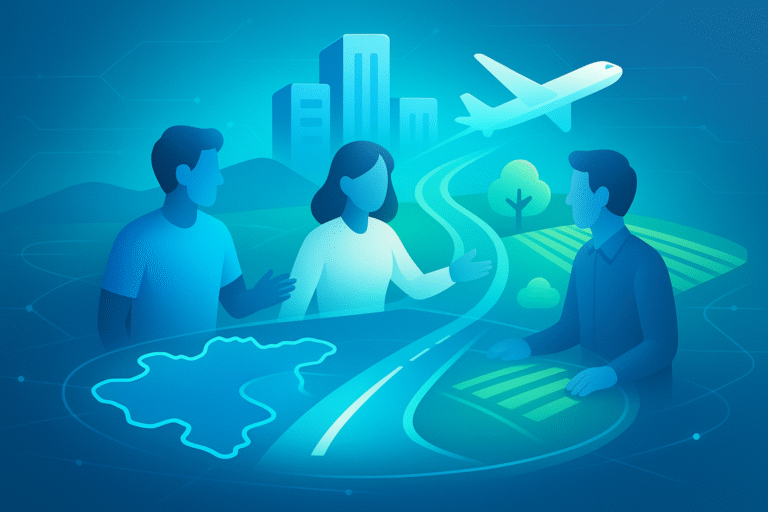Introduction
Over the past decades, contemporary democracies have entered a phase of profound structural transformation. The growing complexity of public policies, the interdependence between different levels of governance, the multiplication of stakeholders involved in decision-making, and a widespread crisis of trust in representative institutions are putting increasing pressure on traditional democratic models.
This transformation does not concern only how decisions are made, but also how they are perceived. Decisions that are opaque, slow, or perceived as distant risk losing legitimacy, even when they are formally correct. At the same time, citizens’ expectations regarding transparency, participation, and the ability to meaningfully influence outcomes have significantly increased.
In this context, digital democracy does not emerge as a simple technological upgrade of politics, nor as a temporary trend driven by innovation. Rather, it represents a systemic attempt to rethink collective decision-making processes, using digital technologies to address long-standing structural challenges of modern democracies.
It is important to clarify from the outset that digital democracy is not about merely transferring analogue processes online. Replicating existing procedures without redesigning them often amplifies their weaknesses instead of solving them. The core issue is not the tool itself, but the design of decision-making processes: who participates, at what stage, on what informational basis, and with what impact on final decisions.
This article is part of a broader research and experimentation effort on digitally mediated collective decision-making. Its aim is to provide a solid conceptual framework that helps readers understand how and why digital democracy can contribute to more legitimate, effective, and sustainable decisions.
Defining digital democracy
Digital democracy can be defined as the set of practices, processes, and infrastructures that use digital technologies to strengthen citizen participation, improve the quality of public deliberation, and make collective decisions more transparent, traceable, and accountable.
This definition highlights a crucial point: technology is not the goal, but the means. Talking about digital democracy means focusing on how collective decisions are made, rather than on the tools used to facilitate them.
To avoid conceptual confusion, it is useful to distinguish digital democracy from related but different domains:
- E-government, which focuses on the digital delivery of public services and administrative procedures;
- Civic tech, which includes tools and initiatives supporting civic engagement and collaboration;
- Online participation, often limited to collecting opinions or feedback without direct impact on decisions.
Digital democracy, by contrast, places the decision-making process at its core. This involves questions such as:
- how decision options are constructed;
- what information is made available to participants;
- how deliberation between different perspectives is structured;
- how final decisions are reached and justified.
A practical introduction to this perspective is available in Participatory platforms online: a practical guide, which explains why digital tools only create value when embedded in well-designed processes.
The OECD stresses that democratic innovation is not about adding new consultation channels, but about creating new institutions and processes capable of integrating citizens’ contributions into public decision-making ( OECD – Innovative Citizen Participation and New Democratic Institutions).
From classical democracy to digital democracy
To understand the significance of digital democracy, it is useful to place it within a broader historical perspective. The history of democracy can be read as a continuous tension between direct participation and limits of scale.
In the Greek polis, collective deliberation was the core of political life, but it was only feasible in relatively small and exclusive communities. With the expansion of modern states, representative democracy became a necessary solution to ensure governability and continuity.
Representation enabled complex societies to function, but it also introduced a structural distance between citizens and decision-makers. Over time, this distance has become increasingly problematic, resulting in:
- declining trust in institutions;
- lower electoral participation;
- difficulties in addressing technically complex or socially controversial decisions.
Digital technologies reopen a long-standing question: how to expand participation without sacrificing decision-making effectiveness. Digital democracy should not be understood as a return to direct democracy, but as an evolution of democratic models capable of integrating representation, deliberation, and distributed participation.
This evolutionary trajectory is explored in From the Greek polis to civic tech: the evolution of participation.
The OECD highlights how deliberative processes can complement representative systems, strengthening decision legitimacy without undermining governability ( OECD – Deliberative Democracy).
Collective intelligence as a democratic resource
One of the most relevant theoretical foundations of digital democracy is the concept of collective intelligence: the ability of diverse groups to generate better decisions than individuals or homogeneous elites.
Research across disciplines shows that diversity of perspectives, experiences, and knowledge can:
- reduce systematic errors;
- surface alternative solutions;
- increase the long-term resilience of decisions.
However, collective intelligence does not emerge automatically. It requires specific conditions:
- access to reliable and shared information;
- clear deliberative rules;
- facilitation and moderation;
- mechanisms for synthesis and feedback.
Without these conditions, participatory processes risk devolving into polarization or unstructured opinion aggregation. This issue is particularly relevant in discussions around artificial intelligence in public decision-making, as explored in AI and public decision-making: risks and opportunities.
Research by The GovLab and Nesta demonstrates that well-designed collective intelligence processes can significantly improve institutions’ capacity to address complex public problems ( The GovLab – Collective Intelligence; Nesta – Using Collective Intelligence to Solve Public Problems).
Speed, authority, and legitimacy: the real dilemma
A central challenge in contemporary governance is the perceived trade-off between speed and participation. Rapid decisions are often associated with centralized authority, while participatory processes are seen as inherently slow.
This is a misleading dichotomy. The real issue is not participation, but the absence of designed decision-making processes. Collective decisions can be made quickly when:
- the decision scope is clearly defined;
- options are prepared in advance;
- timelines are structured and communicated;
- roles and responsibilities are explicit.
In such cases, participation enhances legitimacy without compromising effectiveness. Practical guidance on this approach can be found in How to organise a participatory forum and in the Public consultation transparency checklist.
The OECD identifies decision-making quality as a key determinant of trust in government (OECD – Trust in Government).
What digital democracy is not
Clarifying what digital democracy is not is essential to avoid conceptual misunderstandings and unrealistic expectations. Many initiatives labelled as “digital democracy” fail not because the idea itself is flawed, but because it is reduced to partial or misleading interpretations.
First, digital democracy is not permanent voting or continuous referenda. Systems based exclusively on frequent voting tend to privilege speed over deliberation, often reducing complex issues to binary choices. Without adequate phases of discussion, information sharing, and option building, voting alone cannot guarantee legitimate or sustainable decisions.
Second, digital democracy is not social media engagement. While social platforms can increase visibility and expression, they are structurally ill-suited for collective decision-making. Algorithmic amplification, polarization dynamics, and lack of accountability mechanisms make them unreliable environments for deliberation.
Third, digital democracy is not algorithmic decision-making. The growing use of artificial intelligence in public administration has fueled the illusion that complex social decisions can be automated. In reality, algorithms can support analysis and scenario evaluation, but they cannot replace human judgment, value-based choices, or democratic responsibility.
Finally, digital democracy does not replace representative institutions. Instead, it complements them by introducing structured forms of participation and deliberation that can strengthen legitimacy and trust. As stated in the Council of Europe Recommendation on e-Democracy, digital tools should enhance democratic processes, not undermine institutional accountability.
A frequently misunderstood technology in this context is blockchain. Its potential contribution is limited to specific use cases related to transparency and verification, as discussed in Blockchain and transparent voting.
Core components of effective digital democracy
Comparative analysis of international experiences highlights a set of core components that must coexist for digital democracy to function effectively. These components should be understood as an integrated system rather than independent elements.
- Transparency: participants must have access to clear, complete, and verifiable information about the issue, the process, and the decision criteria.
- Participation: processes should include diverse and representative actors, avoiding both exclusion and overrepresentation of vocal minorities.
- Deliberation: structured discussion is required to compare arguments, assess trade-offs, and refine options.
- Decision: outcomes must be clearly defined, formalised, and connected to institutional responsibilities.
- Accountability: it must be possible to trace decisions over time and evaluate their impacts.
Transparency and data accessibility are explored in depth in Open data and public dashboards, which shows how information design influences participation quality.
The importance of documenting and tracing decisions is analysed in From meeting to automated minutes, highlighting how accountability strengthens legitimacy.
Large comparative datasets such as Participedia confirm that the absence of even one of these components significantly reduces the effectiveness of deliberative processes.
Digital democracy in practice
Digital democracy is not confined to a single institutional context. Its principles can be applied across a wide range of settings, each with specific constraints and objectives.
In local governments, digital democracy supports participatory budgeting, urban planning, and policy co-design. In educational institutions, it plays a formative role by familiarising students with collective decision-making. In residential communities and housing associations, it enables practical, operational decisions that directly affect daily life.
Organisations and companies increasingly adopt participatory approaches to address internal governance challenges, while civic movements use digital deliberation to coordinate collective action.
Concrete examples of these applications are discussed in Barcelona’s digital democracy model and in the Santa Palomba participatory process, which illustrate how theoretical principles translate into operational practices.
The role and limits of digital platforms
Digital platforms are essential infrastructures for participation and deliberation, but they are not decision-making processes in themselves. Their effectiveness depends on governance design rather than technical sophistication.
Platforms create value only when embedded in:
- clearly defined procedural rules;
- explicit roles and responsibilities;
- integration with formal decision-making bodies;
- transparent feedback and follow-up mechanisms.
Without these conditions, platforms risk becoming symbolic tools with limited impact or, worse, amplifiers of existing inequalities. The OECD emphasises that digital government initiatives must be embedded within coherent policy frameworks, as outlined in its work on digital government strategies.
From participation to shared decisions
Participation alone does not guarantee better outcomes. Similarly, decisions taken without meaningful participation often lack legitimacy. Shared decisions represent a balance between pluralism and the capacity to act.
When participation is structured and connected to decision-making authority, it tends to produce:
- more stable and durable outcomes;
- lower levels of conflict and resistance;
- greater trust in institutions;
- broader social and organisational wellbeing.
This transition from participation to shared decisions is explored in the principles of collaborative democracy, which frame participation as a means to improve decision quality rather than an end in itself.
Explore further and experiment
Digital democracy should be understood as an evolving field of research and practice rather than a fixed model. Building legitimate and effective decision-making processes requires continuous learning, experimentation, and adaptation.
Those interested in exploring how these principles can be applied in real-world contexts may wish to explore the Concorder platform or book a free demo to discuss practical use cases.
Further reading and institutional references
The arguments developed in this article are grounded in internationally recognised research and institutional frameworks, including:


